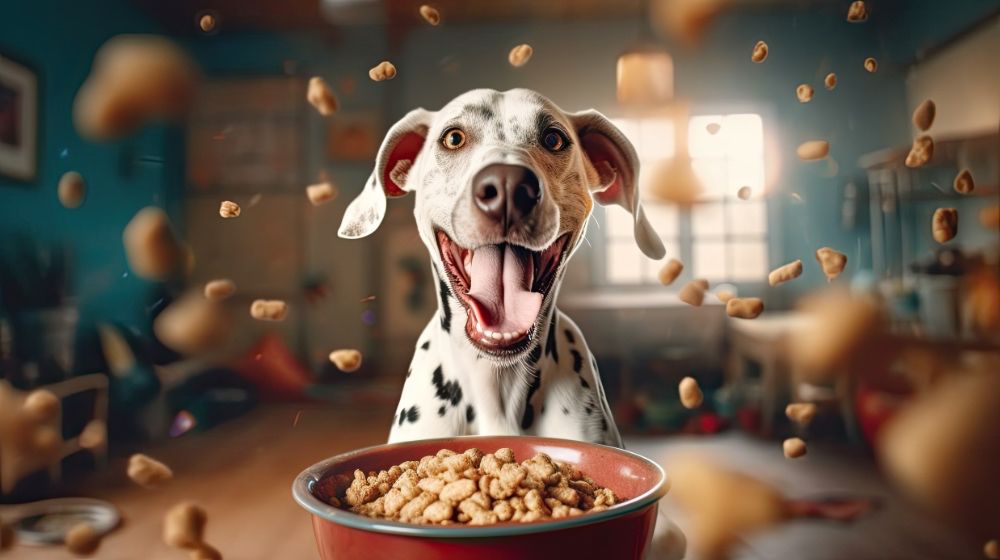Beware The Bloat! Does Your Dog Eat Too Much, Too Fast?
If your dog eats their food too quickly, it can trap gas, food, or fluids and expand their stomachs, making them seriously, or even fatally, ill.

Have you ever been warned to slow down when you eat? That wisdom doubly applies when it comes to your dog! It’s more than a mother’s warnings about indigestion for our furry friends. Eating too fast can trap gas, food or fluids and expand their stomachs., making their stomach twist which can be fatal.
This can happen without much warning, so it is important to see a vet right away. Now this condition, medically known as “Gastric dilatation-volvulus” is most common in dogs that are more than five years old and large breeds. Some examples like Great Danes, boxers, Doberman Pinschers, German Shepherds, Gordon and Irish Setters, St. Bernards, and Weimaraners. Lean dogs with chests larger than their waists (also known as deep-chested) can also be at risk. I know it's a mouthful to pronounce but these things are important to know. First things first, what are the warning signs of bloat in man’s best friend?
How Do We Know Its Bloat?
- Trying To Vomit: Now occasionally, your dog may gag for any number of reasons. However, if they attempt to barf repeatedly with nothing coming up and out, that's an early sign of bloat. The hacking noise is their attempt to get the trapped gas, food or fluid out.
- Pale Gums: Healthy gums, much like humans are meant to be pink. If they are far lighter in color than normal, that's a warning sign. The gums may appear pale or white. This color change can indicate poor blood circulation. It is a good idea to look at their gums when they are healthy, so you can easily recognize the difference.
- Shortness of breath: Panting pups on a hot day or needing some water is normal, but being unable to catch their breath is a concern. If they keep panting despite cooler temperatures and water, be mindful.
- Painful abdomen: Belly rubs are usually a nice treat, but if touching their stomach causes pain, be aware. Especially if your dog reacts with pained whimpering, or aggression. It is best to get a vet’s opinion rather than hoping it will go away.
Symptoms and signs are one thing, but prevention can be a key to avoiding bloat. Running or playing directly after eating should be avoided, much like how people avoid swimming after eating. Rushing right outside after a meal would mix up their stomach badly. Exercise or play time is very important for all dogs and is an essential part of their general well-being and happiness. All dogs should rest for a period after eating or drinking, especially large-breed dogs.
Additionally, rather than one big meal, separating out into multiple smaller meals is one way to prevent bloat. This does not mean lessening the food recommended based on the weight of your dog, but separating out that amount. This idea of breakfast, lunch and dinner is one easy solution. Or just breakfast and dinner helps with a settled stomach, keeping the meal down and your pup peaceful.
There are also specially made “slow-feeder” bowls that help the more excitable eaters among pets. Inhaling food has excess air following it down their throats as well. Water is another element to consider, it is said that your dog should always have water available. Putting up the water bowl while they digest can be a good thing! Excess water right after a full stomach can make it more likely their stomach twists and bloats. If they are very thirsty, you can always pull the water bowl and wait a few minutes before giving them more water. Raised food and water bowls are not recommended, unless directed by your veterinarian.
The most intensive prevention is surgery, which may be done in deep-chested dogs when they are young. Canine gastropexy is a surgical procedure that can prevent stomach twisting, which is the most dangerous part of bloat. During this surgery, a vet carefully attaches the dog’s stomach to the side of the abdominal wall. This stops the stomach from twisting in the future. It’s often done when a dog is already under anesthesia for another surgery, like spaying or neutering. Deciding to have your dog undergo canine gastropexy is a big decision. If your dog is at high risk for bloat, this surgery could be a lifesaving choice.
Remember, your veterinarian will have the best recommendation for your dog. You one hundred percent cannot and should not attempt to treat this condition at home. Even in the early stages of gastric dilatation-volvulus. . There are no home remedies, medications, or supplements that are safe or effective to give a dog that is suffering from bloat. Consider a pet insurance plan that covers bloat. The only correct way to treat bloat is to get your dog to a veterinarian as soon as possible!
Even if it turns out not to be a case of GDV, you and your dog will be happier for the peace of mind and relief a veterinary evaluation can provide. The time wasted trying to give at-home treatments will unnecessarily delay the proper veterinary evaluation and care needed to give your dog the best chance. Within one to two hours, without treatment, your dog will go into shock if they're suffering from GDV.
Avoid the causes, take steps to prevent bloat, and look out for signs and symptoms. Your pup will thank you for it, even if they have to wait a bit to play after meals.


